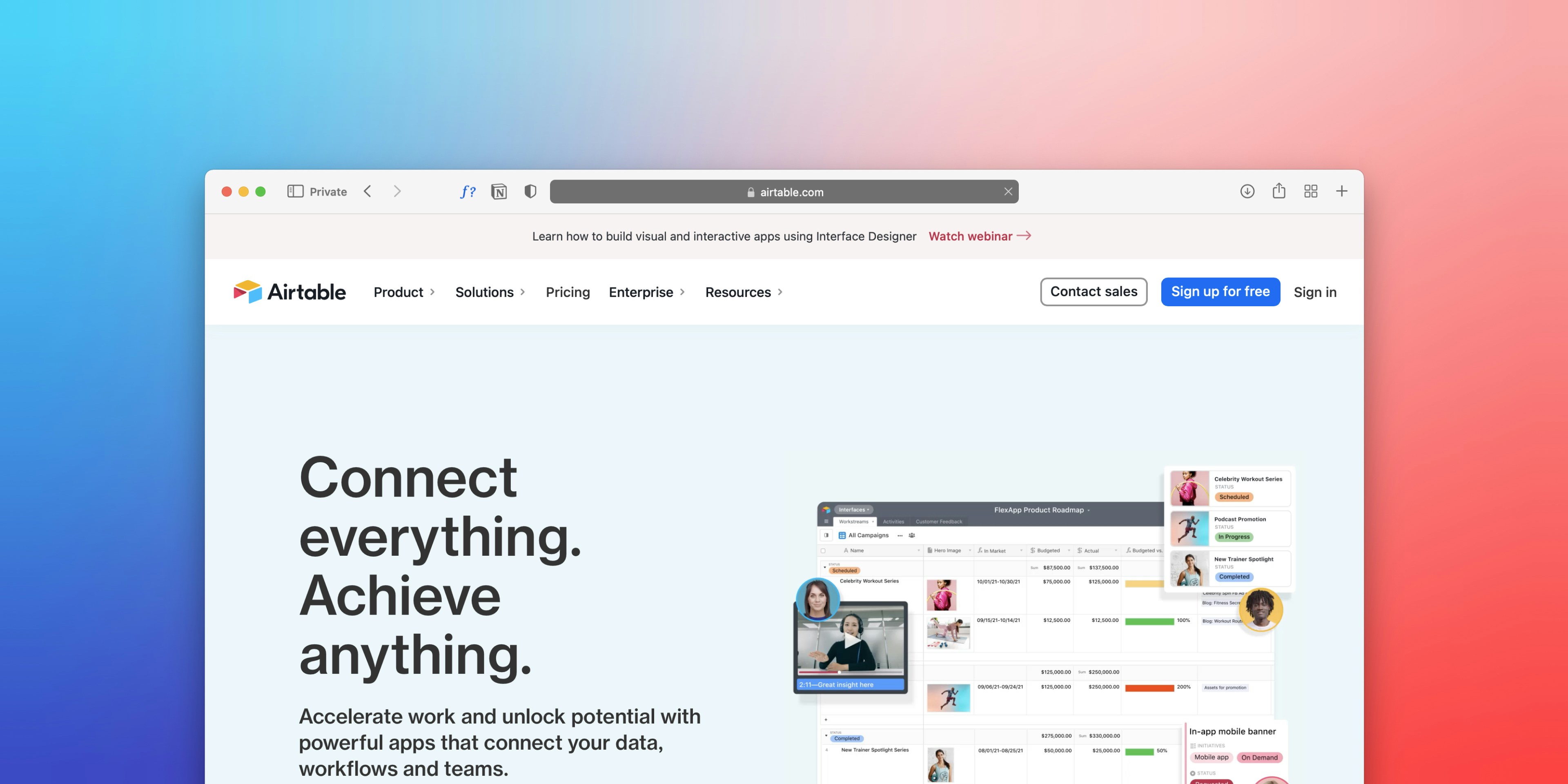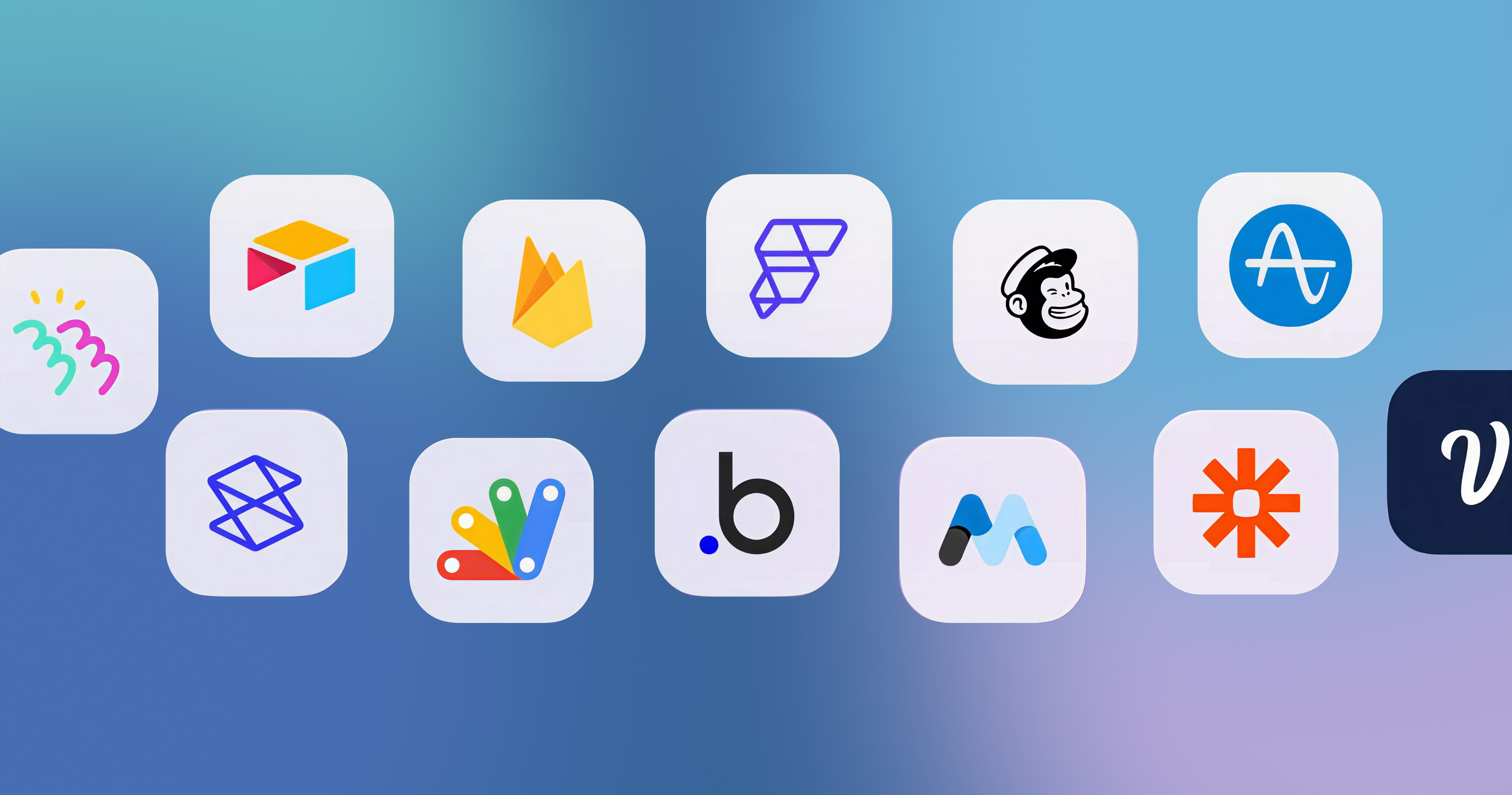-p-2000.png)


10 Best No-Code Startups and Companies in 2023

A new wave of entrepreneurs has emerged, armed with innovative ideas and the power of no code tools to bring those ideas to life.
From website creation to app development, their startups have disrupted traditional industries and proved that no code is more than a passing fad but a practical and efficient method of building a prosperous enterprise.
In this blog, we'll be showcasing the 10 best no code startups that are making waves in their respective industries. Let's dive in!
What are no-code startups?

No code startups are businesses that leverage existing no code or low code platforms to create and launch software applications or products without requiring coding skills or extensive technical knowledge.
These platforms offer intuitive drag-and-drop interfaces and pre-built templates, allowing individuals or teams to build functional websites and software solutions quickly and easily.
Also read: Low-code vs no-code: what’s the real difference?
10 successful no-code startups and companies
The accessibility, speed, cost savings, and flexibility provided by no code tools are contributing to the growth of no code startups. As these tools continue to evolve and improve, we can expect to see even more innovation and growth in the no code startup ecosystem.
Here are some of the most successful no code startups that are making their mark in 2023.
1. Comet

Comet is one of the best no code startups in the freelance market. It is a freelancing marketplace built using Bubble. Comet has already become one of the favourites for venture capital and has successfully secured €14M within 3 years of inception.
So far it has successfully delivered over 300 projects with an average MRR of $800k.
- Founders: Charles Thomas, Joseph, and Valentin
- Official website: www.comet.co
- No code tools used: Bubble
- Funds raised: €14 million raised in Series A in 2018
2. Teal

Teal is another no code startup that helps people to find their desired jobs. Teal lets people organize their job hunt activities and find better jobs.
It was initially built on Bubble and then Webflow. They’ve also used Typeform for surveys and Airtable for database management — connecting everything using Zapier.
Also read: Top 15 Reasons to Use Webflow for Your Next Website
The platform has raised over $11 million from investors and helps millions of people with their job search.
- Founder: David Fano
- Official website: www.tealhq.com
- No code tools used: Bubble, Webflow, Typeform, Airtable and Zapier
- Funds raised: $11 million from City Light Capital, Flybridge Capital, Oceans, Human Ventures, and many more.
3. Qoins

Qoins is a financial app that is designed to help you pay off your debt and save money faster. The platform provides financial coaching, tips, and more using a mobile app.
Bubble helped the Qoins team to develop the seamless app with a minimum team.
Qoins have won the Fintech Innovation Award Challenge — the most prominent award for fintech companies in the United States.
This no code startup team managed to raise total funding of $2.3m since their launch.
- Founders: Nate Washington Jr. and Christian Zimmerman
- Official website: www.qoins.com
- No code tools used: Bubble
- Funds Raised: Raised $2.3m funding in total to date
4. Makerpad

Markerpad is a no code platform that allows users to create and customize web and mobile applications without writing any code.
The platform also offers a range of pre-built templates, integrations, and widgets that can be easily customized to suit specific needs and preferences.
Ben Tossell founded this no code startup in 2019. Later it was acquired by Zapier in 2021.
- Founder: Ben Tossell
- Official website: makerpad.zapier.com
- Category: E-learning
- No code tools used: Webflow, Zapier, Airtable, and MemberStack
- Revenue: ARR of $400,000 as of March 2021
5. Flexiple

If you’re looking for a talented freelance professional, don’t worry, Felxiple got your back. Flexiple is one of the best no code startups that focuses entirely on freelancers.
This no code startup makes $3 million in revenue and was built on no code tools which cost just $60 per month. Felxiple uses tools like Unicorn Platform, Airtable, Bubble, and Webflow.
- Founder: Karthik Sridharan
- Official website: www.flexiple.com
- No code tools used: Bubble, Webflow, Airtable, Unicorn Platform, Zapier
- Annual Revenue: $3 million+ as of Nov 2021
6. Roast My Landing Page

As the name suggests, Roast My Landing Page is a personalized landing page roast service. Oliver Meakings, a landing page optimization expert found this no code startup to facilitate customer growth for SaaS companies.
Till now, Roast My Landing Page has completed more than 500 roasts. They give major correction tips and fixes to improve the website.
- Founder: Oliver Meakings
- Official website: www.roastmylandingpage.com
- Category: Marketing and Advertising
- No code tools used: Webflow
- Revenue: $4,000+ per month
7. Letterhunt

Letterhunt is a newsletter directory which helps marketers, readers, and founders discover niche newsletters. This no code startup was created on the no code tool Softr.
Letterhunt now has more than 10,000+ newsletters across 20+ categories.
- Founders: Akhil BVS and Madan Rawtani
- Official website: www.letterhunt.co
- No code tools used: Softr
- Revenue: $4,000 in just 2 months
8. Swipe Files

Swipe files is a no code startup that gives top-notch SaaS marketing training for founders, agencies and marketers. It basically gives you a curated list of headlines, copies, landing pages etc. —a swipe file, that can be used in your marketing content.
More than 500 marketers are using Swipe Files to grow their SaaS business. This no code startup has its own community where you can get feedback from fellow marketers, interact and network while building your perfect marketing plan.
- Founder: Corey Haines
- Official website: www.swipefiles.com
- No-code tools used: Webflow, Jetboost, Memberstack, Shoutout, Circle, Fathom, ConvertKit, RightMessage, Rewardful, Beamer, Transistor, Podia, Mailbrew, SparkLoop, Riverside, Integromat
- Revenue: $10,000+ per month
Curious about the no code tools for Saas company? Read this: 12 No-Code Tools to Build a SaaS MVP Without Coding
9. Dividend Finance

The story of Dividend Finance is not different from other successful no code startups. Founders Eric White and Steve Michella started this no code startup to help homeowners secure financing for home improvements and add renewable energy solutions to their homes.
Dividend Finance was built on Bubble and they have managed to process over $1 billion in sales over the years.
- Founders: Eric White, Steve Michella
- Official website: www.dividendfinance.com
- No code tools used: Bubble
- Funds Raised: $384 million
10. Bloom Institute of Technology

This no code startup is aimed to fix the broken education systems. The company started as Lambda School and later changed its name to Bloom Institute of Technology. They help students to learn new skills, attend online courses and more.
This platform became quite popular among the students as they were following Income Share Agreement Model where the student need to pay the fee only after securing a job.
They used Typeform, Airtable, Retool, and Webflow to develop and launch an MVP for 3,000 users.
- Founders: Austen Allred and Ben Nelson
- Official website: www.bloomtech.com
- No code tools used: Webflow, Typeform, Airtable, and Zapier
- Funds raised: $122 million
Why is no-code the future of startups and development?

Experts believe that by 2024, no code startups going to generate $187 billion in revenue. No code platforms have significantly reduced the cost and time required to create a new application. This rapid growth of no code development has decreased the entry barrier for software development.
Want to know more? Read this: 18 Reasons Why No Code/Low code Is the Future of Development.

Reach out to our no-code experts!
Schedule a CallReach out to our no-code experts!
Schedule a CallFAQ
Why is no code so popular?
No code has become popular because it allows individuals with no programming experience to create software applications and automate processes, often quickly and with minimal effort.
No code platforms provide pre-built modules, templates, and drag-and-drop interfaces that enable users to build complex applications without needing to write any code.
What can you build with no code?
A no code tool can help you with creating a wide variety of products. Just like the above-mentioned no code startups, it can vary from a food-ordering mobile app to a roasting website land page.
As technology continues to evolve, the possibilities will only continue to expand. The key benefit of no code is that it empowers individuals and businesses to create customized software applications quickly and easily.
What considerations should I make when choosing a no code platform?
Choosing the right no code platform plays a significant role in no code development. Ease of use, customization, scalability, integration and pricing are few of the key points you need to look at while choosing your tool.
By considering these factors, you can choose a no code platform that best meets your needs and enables you to build your no code startup.
Editorial Team
Publisher
A new wave of entrepreneurs has emerged, armed with innovative ideas and the power of no code tools to bring those ideas to life.
From website creation to app development, their startups have disrupted traditional industries and proved that no code is more than a passing fad but a practical and efficient method of building a prosperous enterprise.
In this blog, we'll be showcasing the 10 best no code startups that are making waves in their respective industries. Let's dive in!
What are no-code startups?

No code startups are businesses that leverage existing no code or low code platforms to create and launch software applications or products without requiring coding skills or extensive technical knowledge.
These platforms offer intuitive drag-and-drop interfaces and pre-built templates, allowing individuals or teams to build functional websites and software solutions quickly and easily.
Also read: Low-code vs no-code: what’s the real difference?
10 successful no-code startups and companies
The accessibility, speed, cost savings, and flexibility provided by no code tools are contributing to the growth of no code startups. As these tools continue to evolve and improve, we can expect to see even more innovation and growth in the no code startup ecosystem.
Here are some of the most successful no code startups that are making their mark in 2023.
1. Comet

Comet is one of the best no code startups in the freelance market. It is a freelancing marketplace built using Bubble. Comet has already become one of the favourites for venture capital and has successfully secured €14M within 3 years of inception.
So far it has successfully delivered over 300 projects with an average MRR of $800k.
- Founders: Charles Thomas, Joseph, and Valentin
- Official website: www.comet.co
- No code tools used: Bubble
- Funds raised: €14 million raised in Series A in 2018
2. Teal

Teal is another no code startup that helps people to find their desired jobs. Teal lets people organize their job hunt activities and find better jobs.
It was initially built on Bubble and then Webflow. They’ve also used Typeform for surveys and Airtable for database management — connecting everything using Zapier.
Also read: Top 15 Reasons to Use Webflow for Your Next Website
The platform has raised over $11 million from investors and helps millions of people with their job search.
- Founder: David Fano
- Official website: www.tealhq.com
- No code tools used: Bubble, Webflow, Typeform, Airtable and Zapier
- Funds raised: $11 million from City Light Capital, Flybridge Capital, Oceans, Human Ventures, and many more.
3. Qoins

Qoins is a financial app that is designed to help you pay off your debt and save money faster. The platform provides financial coaching, tips, and more using a mobile app.
Bubble helped the Qoins team to develop the seamless app with a minimum team.
Qoins have won the Fintech Innovation Award Challenge — the most prominent award for fintech companies in the United States.
This no code startup team managed to raise total funding of $2.3m since their launch.
- Founders: Nate Washington Jr. and Christian Zimmerman
- Official website: www.qoins.com
- No code tools used: Bubble
- Funds Raised: Raised $2.3m funding in total to date
4. Makerpad

Markerpad is a no code platform that allows users to create and customize web and mobile applications without writing any code.
The platform also offers a range of pre-built templates, integrations, and widgets that can be easily customized to suit specific needs and preferences.
Ben Tossell founded this no code startup in 2019. Later it was acquired by Zapier in 2021.
- Founder: Ben Tossell
- Official website: makerpad.zapier.com
- Category: E-learning
- No code tools used: Webflow, Zapier, Airtable, and MemberStack
- Revenue: ARR of $400,000 as of March 2021
5. Flexiple

If you’re looking for a talented freelance professional, don’t worry, Felxiple got your back. Flexiple is one of the best no code startups that focuses entirely on freelancers.
This no code startup makes $3 million in revenue and was built on no code tools which cost just $60 per month. Felxiple uses tools like Unicorn Platform, Airtable, Bubble, and Webflow.
- Founder: Karthik Sridharan
- Official website: www.flexiple.com
- No code tools used: Bubble, Webflow, Airtable, Unicorn Platform, Zapier
- Annual Revenue: $3 million+ as of Nov 2021
6. Roast My Landing Page

As the name suggests, Roast My Landing Page is a personalized landing page roast service. Oliver Meakings, a landing page optimization expert found this no code startup to facilitate customer growth for SaaS companies.
Till now, Roast My Landing Page has completed more than 500 roasts. They give major correction tips and fixes to improve the website.
- Founder: Oliver Meakings
- Official website: www.roastmylandingpage.com
- Category: Marketing and Advertising
- No code tools used: Webflow
- Revenue: $4,000+ per month
7. Letterhunt

Letterhunt is a newsletter directory which helps marketers, readers, and founders discover niche newsletters. This no code startup was created on the no code tool Softr.
Letterhunt now has more than 10,000+ newsletters across 20+ categories.
- Founders: Akhil BVS and Madan Rawtani
- Official website: www.letterhunt.co
- No code tools used: Softr
- Revenue: $4,000 in just 2 months
8. Swipe Files

Swipe files is a no code startup that gives top-notch SaaS marketing training for founders, agencies and marketers. It basically gives you a curated list of headlines, copies, landing pages etc. —a swipe file, that can be used in your marketing content.
More than 500 marketers are using Swipe Files to grow their SaaS business. This no code startup has its own community where you can get feedback from fellow marketers, interact and network while building your perfect marketing plan.
- Founder: Corey Haines
- Official website: www.swipefiles.com
- No-code tools used: Webflow, Jetboost, Memberstack, Shoutout, Circle, Fathom, ConvertKit, RightMessage, Rewardful, Beamer, Transistor, Podia, Mailbrew, SparkLoop, Riverside, Integromat
- Revenue: $10,000+ per month
Curious about the no code tools for Saas company? Read this: 12 No-Code Tools to Build a SaaS MVP Without Coding
9. Dividend Finance

The story of Dividend Finance is not different from other successful no code startups. Founders Eric White and Steve Michella started this no code startup to help homeowners secure financing for home improvements and add renewable energy solutions to their homes.
Dividend Finance was built on Bubble and they have managed to process over $1 billion in sales over the years.
- Founders: Eric White, Steve Michella
- Official website: www.dividendfinance.com
- No code tools used: Bubble
- Funds Raised: $384 million
10. Bloom Institute of Technology

This no code startup is aimed to fix the broken education systems. The company started as Lambda School and later changed its name to Bloom Institute of Technology. They help students to learn new skills, attend online courses and more.
This platform became quite popular among the students as they were following Income Share Agreement Model where the student need to pay the fee only after securing a job.
They used Typeform, Airtable, Retool, and Webflow to develop and launch an MVP for 3,000 users.
- Founders: Austen Allred and Ben Nelson
- Official website: www.bloomtech.com
- No code tools used: Webflow, Typeform, Airtable, and Zapier
- Funds raised: $122 million
Why is no-code the future of startups and development?

Experts believe that by 2024, no code startups going to generate $187 billion in revenue. No code platforms have significantly reduced the cost and time required to create a new application. This rapid growth of no code development has decreased the entry barrier for software development.
Want to know more? Read this: 18 Reasons Why No Code/Low code Is the Future of Development.
Reach out to our no-code experts!
Button TextFAQ
Why is no code so popular?
No code has become popular because it allows individuals with no programming experience to create software applications and automate processes, often quickly and with minimal effort.
No code platforms provide pre-built modules, templates, and drag-and-drop interfaces that enable users to build complex applications without needing to write any code.
What can you build with no code?
A no code tool can help you with creating a wide variety of products. Just like the above-mentioned no code startups, it can vary from a food-ordering mobile app to a roasting website land page.
As technology continues to evolve, the possibilities will only continue to expand. The key benefit of no code is that it empowers individuals and businesses to create customized software applications quickly and easily.
What considerations should I make when choosing a no code platform?
Choosing the right no code platform plays a significant role in no code development. Ease of use, customization, scalability, integration and pricing are few of the key points you need to look at while choosing your tool.
By considering these factors, you can choose a no code platform that best meets your needs and enables you to build your no code startup.
Editorial Team
Publisher
Conclusion
To sum up, the advent of no code tools has brought about a fundamental change in the way software development is approached, empowering entrepreneurs to realize their visions without any coding knowledge.
Looking for a No code tool to build a SaaS MVP? Check out: 12 No code tools to build your SaaS MVP without coding
The success stories of the ten startups we've explored in this blog attest to the effectiveness of no code, highlighting that it is not a passing trend but a practical way to establish a thriving business.
On a side note, if you need a partner to support your web and mobile app development processes on any no code platform, Seattle New Media can be your best friend. Reach out to our no-code experts for a free, no-obligation consultation call!




Hi, I'm Mike!
If you are enjoying the article, feel free to subscribe to our monthly newsletter.
If you have any project requirements, please contact us.







.png)









